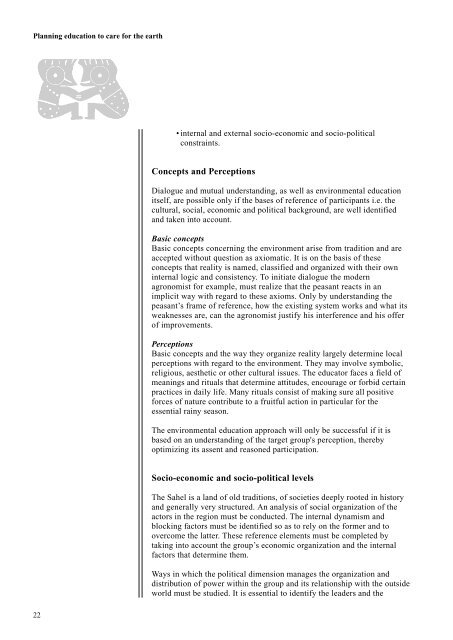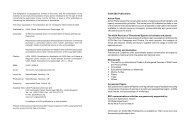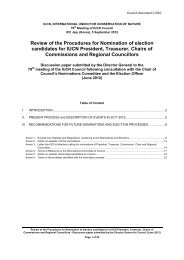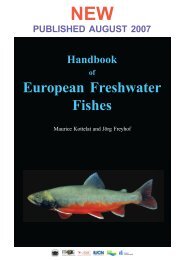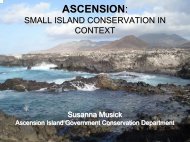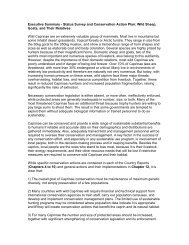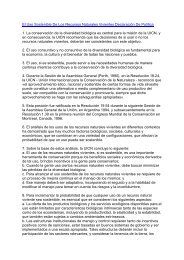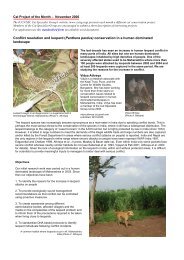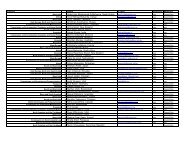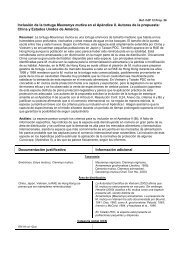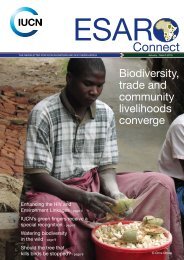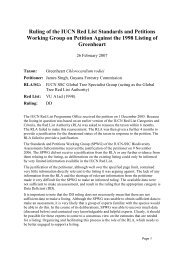Planning education to care for the earth - IUCN Knowledge Network
Planning education to care for the earth - IUCN Knowledge Network
Planning education to care for the earth - IUCN Knowledge Network
Create successful ePaper yourself
Turn your PDF publications into a flip-book with our unique Google optimized e-Paper software.
<strong>Planning</strong> <strong>education</strong> <strong>to</strong> <strong>care</strong> <strong>for</strong> <strong>the</strong> <strong>earth</strong>• internal and external socio-economic and socio-politicalconstraints.Concepts and PerceptionsDialogue and mutual understanding, as well as environmental <strong>education</strong>itself, are possible only if <strong>the</strong> bases of reference of participants i.e. <strong>the</strong>cultural, social, economic and political background, are well identifiedand taken in<strong>to</strong> account.Basic conceptsBasic concepts concerning <strong>the</strong> environment arise from tradition and areaccepted without question as axiomatic. It is on <strong>the</strong> basis of <strong>the</strong>seconcepts that reality is named, classified and organized with <strong>the</strong>ir owninternal logic and consistency. To initiate dialogue <strong>the</strong> modernagronomist <strong>for</strong> example, must realize that <strong>the</strong> peasant reacts in animplicit way with regard <strong>to</strong> <strong>the</strong>se axioms. Only by understanding <strong>the</strong>peasant’s frame of reference, how <strong>the</strong> existing system works and what itsweaknesses are, can <strong>the</strong> agronomist justify his interference and his offerof improvements.PerceptionsBasic concepts and <strong>the</strong> way <strong>the</strong>y organize reality largely determine localperceptions with regard <strong>to</strong> <strong>the</strong> environment. They may involve symbolic,religious, aes<strong>the</strong>tic or o<strong>the</strong>r cultural issues. The educa<strong>to</strong>r faces a field ofmeanings and rituals that determine attitudes, encourage or <strong>for</strong>bid certainpractices in daily life. Many rituals consist of making sure all positive<strong>for</strong>ces of nature contribute <strong>to</strong> a fruitful action in particular <strong>for</strong> <strong>the</strong>essential rainy season.The environmental <strong>education</strong> approach will only be successful if it isbased on an understanding of <strong>the</strong> target group's perception, <strong>the</strong>rebyoptimizing its assent and reasoned participation.Socio-economic and socio-political levelsThe Sahel is a land of old traditions, of societies deeply rooted in his<strong>to</strong>ryand generally very structured. An analysis of social organization of <strong>the</strong>ac<strong>to</strong>rs in <strong>the</strong> region must be conducted. The internal dynamism andblocking fac<strong>to</strong>rs must be identified so as <strong>to</strong> rely on <strong>the</strong> <strong>for</strong>mer and <strong>to</strong>overcome <strong>the</strong> latter. These reference elements must be completed bytaking in<strong>to</strong> account <strong>the</strong> group’s economic organization and <strong>the</strong> internalfac<strong>to</strong>rs that determine <strong>the</strong>m.Ways in which <strong>the</strong> political dimension manages <strong>the</strong> organization anddistribution of power within <strong>the</strong> group and its relationship with <strong>the</strong> outsideworld must be studied. It is essential <strong>to</strong> identify <strong>the</strong> leaders and <strong>the</strong>22


